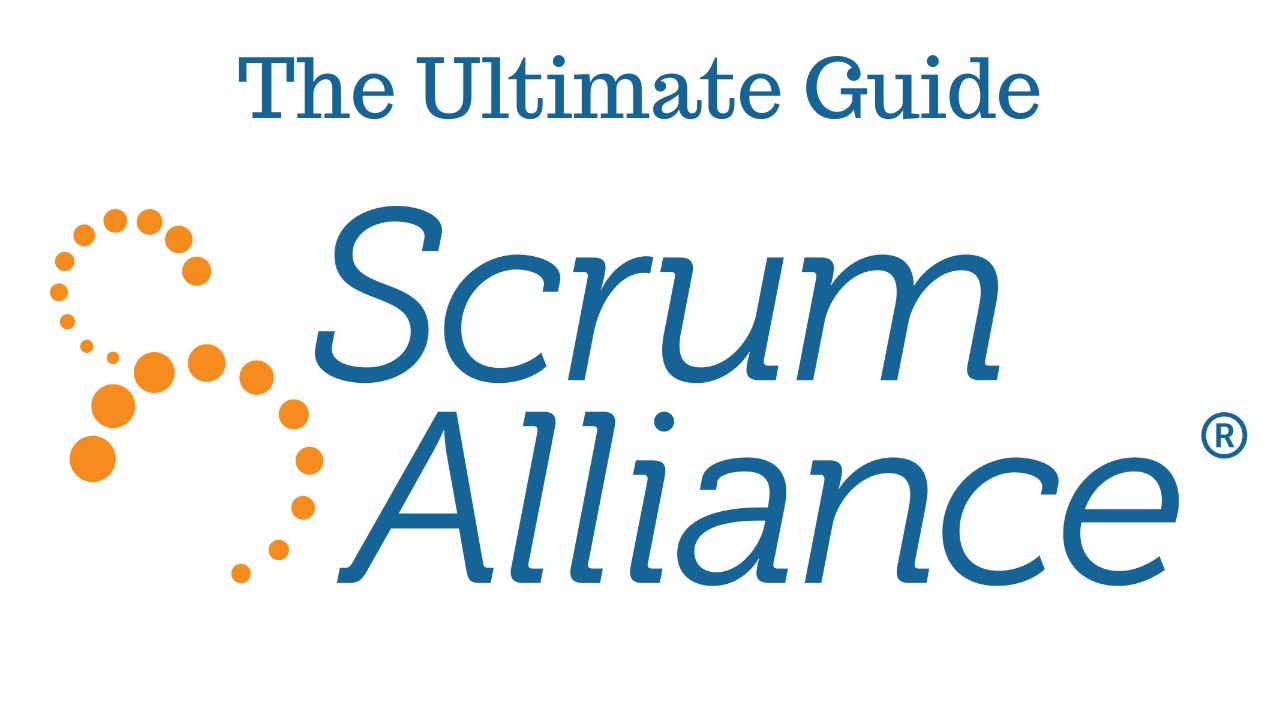Scrum Alliance Training and Certification – The Ultimate Guide
The Evolution of Scrum Alliance
From its inception, Scrum Alliance has evolved into a global authority, driving the adoption of Agile practices and Scrum methodologies. With a visionary founding team, a clear mission, and a commitment to professional development, Scrum Alliance has empowered countless individuals and organizations on their Agile journey.
By offering certifications, fostering community engagement, and advocating for Agile practices, Scrum Alliance continues to shape the Agile landscape, inspiring practitioners worldwide. Embracing the core values of collaboration, transparency, and continuous improvement, Scrum Alliance remains dedicated to transforming the world of work and delivering exceptional results in the Agile era.

Founders, Vision, and Mission
Ken Schwaber is one of the leaders of the agile software development movement who founded the Agile Alliance and created the Certified Scrum Master programs and their derivatives.
Driven by their collective commitment to promoting Agile practices and Scrum methodologies, he envisioned an organization that would serve as a global hub for Agile enthusiasts, fostering collaboration, and supporting professional development.
The mission of Scrum Alliance is to transform the world of work by guiding individuals and organizations in adopting Agile practices. They strive to provide a platform for knowledge sharing, learning, and networking, enabling practitioners to enhance their skills, embrace Agile values, and deliver high-quality results.

Evolution and Growth
Scrum Alliance began as a small, grassroots movement, gaining momentum and recognition within the Agile community. Early on, the organization focused on offering certifications, training programs, and community events to promote the principles and practices of Scrum.
As the Agile movement gained traction across industries, Scrum Alliance expanded its reach, attracting Agile enthusiasts, practitioners, and thought leaders from around the globe. Through strategic partnerships, collaborations, and continuous innovation, Scrum Alliance experienced exponential growth, becoming a trusted name in the Agile landscape.

Milestones and Contributions
Over the years, Scrum Alliance has achieved several significant milestones, marking its influence and contributions to the Agile community.
These milestones include:
- Introduction of Certified ScrumMaster® (CSM®) Certification: Ken Schwaber initially designed the CSM course in 2002. Thereafter, he introduced the updated version of CSM in 2009. Scrum Alliance introduced the CSM certification, providing individuals with a recognized credential to validate their Scrum knowledge and expertise. The CSM certification became a cornerstone for Agile practitioners seeking professional growth.
- Expansion of Certification Offerings: Recognizing the need for specialized roles within Agile teams, Scrum Alliance expanded its certification portfolio to include Certified Scrum Product Owner® (CSPO®), Certified Scrum Developer® (CSD®), and Certified Agile Leadership (CAL) certifications. This expansion catered to the diverse needs of Agile professionals across different roles and responsibilities.
- Global Community Engagement: Scrum Alliance fostered a vibrant community by organizing global events, conferences, and local user groups. These platforms provided opportunities for Agile practitioners to connect, share knowledge, and learn from industry experts. The Scrum Alliance community became a rich source of inspiration and support for Agile enthusiasts worldwide.
- Advocacy for Agile Practices: Scrum Alliance actively promotes Agile practices and Scrum methodologies through thought leadership, research, and the publication of insightful articles, whitepapers, and case studies. The organization has been at the forefront of advocating for Agile transformation, helping organizations unlock their potential for increased productivity, adaptability, and customer satisfaction.
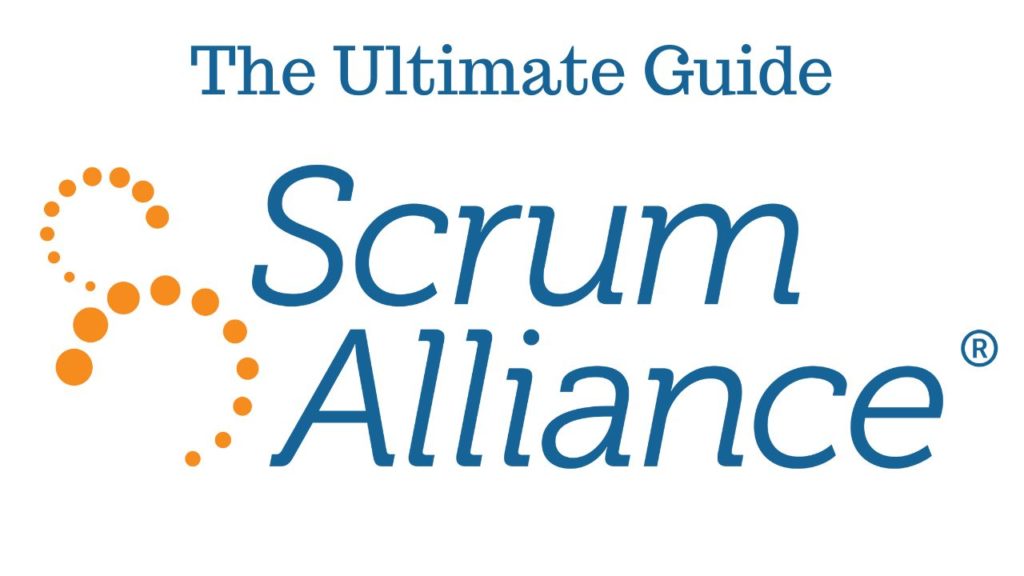
A Beginner’s Guide with Scrum Alliance
Agile principles and the Scrum framework have transformed project management and product development by emphasizing iterative progress, collaboration, and adaptability. With the support of Scrum Alliance, organizations can implement Agile methodologies effectively, enabling them to embrace continuous improvement, respond to changing requirements, and deliver value to customers.
Through certifications, community engagement, resources, and coaching, Scrum Alliance empowers individuals and organizations, regardless of their level of familiarity with Agile, to thrive in the dynamic and fast-paced world of Agile practices.
Understanding Agile Principles
Agile is an approach to project management and product development that emphasizes flexibility, customer collaboration, and iterative progress.
The key principles of Agile include:
- Customer Satisfaction: Placing a high value on satisfying customer needs through early and continuous delivery of valuable software or products.
- Iterative Development: Breaking work into smaller increments, called iterations or sprints, to allow for continuous feedback and improvement.
- Collaboration: Encouraging close collaboration between cross-functional teams, stakeholders, and customers throughout the project lifecycle.
- Adaptability: Embracing change and responding to it effectively, even in the later stages of development.
- Self-Organizing Teams: Empowering teams to make decisions and manage their own work, fostering ownership and accountability.
Understanding the Scrum Framework
Scrum is one of the most widely used Agile frameworks, providing a lightweight and iterative approach to project management. Here are the key elements of the Scrum framework:
Scrum Roles
- Product Owner: Represents the customer and defines product requirements, priorities, and vision.
- Scrum Master: Facilitates the Scrum process, removes obstacles, and ensures the team follows Scrum principles.
- Developers: Self-organizing, cross-functional team responsible for delivering the product increment.
Scrum Artifacts
- Product Backlog: A prioritized list of user stories and product requirements.
- Sprint Backlog: The subset of the product backlog items selected for a specific sprint.
- Increment: The product functionality that is developed and potentially releasable at the end of each sprint.
Scrum Events
- Sprint Planning: The team plans the work to be done in the upcoming sprint.
- Daily Scrum: A brief daily meeting for team members to synchronize their work and plan for the day.
- Sprint Review: The team presents the completed work to stakeholders and collects feedback.
- Sprint Retrospective: A reflection on the sprint to identify improvements and adapt the process.
Scrum Alliance and Agile Implementation
Scrum Alliance, a prominent organization in the Agile community, plays a crucial role in supporting organizations in implementing Agile methodologies, particularly through the Scrum framework.
Here’s how Scrum Alliance facilitates Agile implementation:
- Certification and Training: Scrum Alliance offers certifications like Certified ScrumMaster® (CSM®) and Certified Scrum Product Owner® (CSPO®). These certifications provide individuals with the knowledge and skills required to apply Agile and Scrum principles effectively.
- Community and Knowledge Sharing: Scrum Alliance fosters a vibrant community of Agile practitioners, where knowledge, experiences, and best practices are shared. This collaborative environment enables individuals to learn from each other and gain insights into successful Agile implementation.
- Resources and Guidance: Scrum Alliance provides a wealth of resources, including articles, case studies, and templates, that assist organizations in understanding and implementing Agile methodologies. These resources offer practical guidance, tips, and real-world examples to support Agile transformation journeys.
- Agile Coaching and Support: Scrum Alliance offers Agile coaching certifications and resources, allowing organizations to access expert guidance during their Agile implementation. Agile coaches provide valuable insights, help navigate challenges, and facilitate a smoother transition to Agile practices.
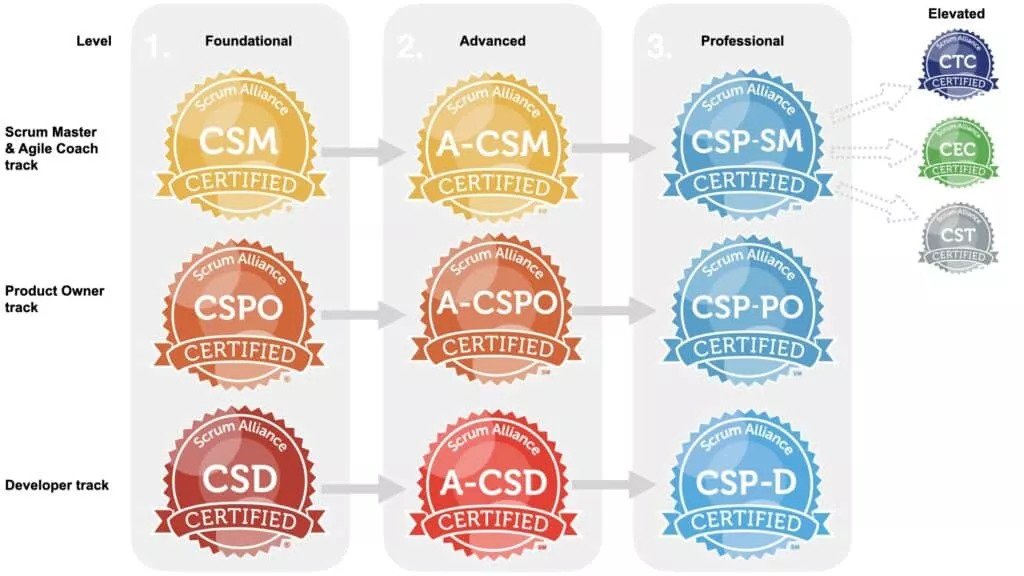
Scrum Alliance Certifications Demystified
Scrum Alliance certifications provide professionals with recognized credentials to validate their Agile knowledge and skills.
From the foundational CSM and CSPO certifications to the advanced A-CSM and A-CSPO certifications, Scrum Alliance offers a range of options for individuals at different stages of their Agile journey. By obtaining these certifications, professionals can enhance their career prospects, demonstrate expertise in Agile methodologies, and contribute to the success of Agile teams and organizations.
Attendees can take their exams online following the completion of their respective courses. For renewal, professionals can apply for renewal and track their SEU activities through the Scrum Alliance website. Renewal does not require an additional exam but is based on the accumulation of SEUs, which reflect ongoing learning and participation in the Agile community.
Let’s start…
Certified ScrumMaster® (CSM®)
Requirements: To obtain the CSM certification, individuals must complete a two-day CSM course conducted by a Certified Scrum Trainer® (CST®) and pass the online CSM exam.
Benefits: The CSM certification validates a solid understanding of Scrum principles, practices, and the role of a ScrumMaster. It equips professionals with the skills to facilitate Agile teams and promote collaboration, leading to improved project outcomes.
Career Impact: CSM certification enhances career prospects, demonstrating expertise in Agile project management. Certified ScrumMasters often find opportunities in organizations adopting Scrum practices.
Pricing: The cost of a CSM course typically ranges from $800 to $1,500, depending on the training provider and location. The price includes the first attempt at the CSM exam.
Exam Process: The CSM exam is an online assessment that can be taken after completing the CSM course. Attendees will receive instructions on how and when to take the exam from their Certified Scrum Trainer.
Renewal Process: To renew the CSM certification, professionals need to earn Scrum Education Units® (SEUs®). SEUs can be earned through various activities such as attending Scrum Alliance-approved events, participating in webinars, or engaging in self-directed learning.
Renewal Exam: There is no renewal exam for the CSM certification. Renewal is based on the accumulation of SEUs, which demonstrate ongoing learning and engagement in the Agile community.
Certified Scrum Product Owner® (CSPO®)
Requirements: To achieve the CSPO certification, individuals must complete a two-day CSPO course delivered by a Certified Scrum Trainer and pass the online CSPO exam.
Benefits: The CSPO certification focuses on product ownership in Agile teams, equipping professionals with skills to effectively manage product backlogs, prioritize requirements, and collaborate with stakeholders. It enhances their ability to deliver valuable products and services.
Career Impact: CSPO certification can open doors to product management and ownership roles in organizations practicing Scrum. It positions professionals to lead product development and maximize customer value.
Pricing: The cost of a CSPO course typically ranges from $800 to $1,500, varying based on the training provider and location. The price includes the first attempt at the CSPO exam.
Exam Process: The CSPO exam is an online assessment that can be taken after completing the CSPO course. Attendees will receive instructions on how and when to take the exam from their Certified Scrum Trainer.
Renewal Process: To renew the CSPO certification, professionals need to earn Scrum Education Units (SEUs). SEUs can be earned through various activities such as attending Scrum Alliance-approved events, participating in webinars, or engaging in self-directed learning.
Renewal Exam: There is no renewal exam for the CSPO certification. Renewal is based on the accumulation of SEUs, which demonstrate ongoing learning and engagement in the Agile community.
Advanced Certified ScrumMaster® (A-CSM®):
Requirements: To pursue the A-CSM certification, individuals must hold an active CSM certification and complete specific educational objectives, which may include attending a two-day A-CSM course and demonstrating proficiency in Agile coaching.
Benefits: A-CSM certification enhances ScrumMasters’ coaching abilities, enabling them to guide teams through Agile transformations, resolve challenges, and promote continuous improvement. It deepens their understanding of Agile coaching techniques.
Career Impact: A-CSM certification differentiates ScrumMasters as experienced Agile professionals capable of coaching and mentoring others. It can lead to advanced leadership roles and increased responsibility within Agile teams.
Pricing: The cost of an A-CSM course typically ranges from $1,200 to $2,000, depending on the training provider and location. The price includes the first attempt at the A-CSM exam.
Exam Process: The A-CSM exam is an online assessment that can be taken after completing the A-CSM course. Attendees will receive instructions on how and when to take the exam from their Certified Scrum Trainer.
Renewal Process: To renew the A-CSM certification, professionals need to earn Scrum Education Units (SEUs). SEUs can be earned through various activities such as attending Scrum Alliance-approved events, participating in webinars, or engaging in self-directed learning.
Renewal Exam: There is no renewal exam for the A-CSM certification. Renewal is based on the accumulation of SEUs, which demonstrate ongoing learning and engagement in the Agile community.
Advanced Certified Scrum Product Owner® (A-CSPO®)
Requirements: To pursue the A-CSPO certification, individuals must hold an active CSPO certification and fulfill specific educational objectives, which may include attending a two-day A-CSPO course and demonstrating product ownership expertise.
Benefits: A-CSPO certification deepens the understanding of product ownership, equipping professionals to make informed decisions, collaborate effectively, and maximize product value. It enhances their ability to align business objectives with customer needs.
Career Impact: A-CSPO certification positions professionals as knowledgeable and skilled product owners capable of driving successful product development. It expands career opportunities in organizations utilizing Scrum practices.
Pricing: The cost of an A-CSPO course typically ranges from $1,200 to $2,000, varying based on the training provider and location. The price includes the first attempt at the A-CSPO exam.
Exam Process: The A-CSPO exam is an online assessment that can be taken after completing the A-CSPO course. Attendees will receive instructions on how and when to take the exam from their Certified Scrum Trainer.
Renewal Process: To renew the A-CSPO certification, professionals need to earn Scrum Education Units (SEUs). SEUs can be earned through various activities such as attending Scrum Alliance-approved events, participating in webinars, or engaging in self-directed learning.
Renewal Exam: There is no renewal exam for the A-CSPO certification. Renewal is based on the accumulation of SEUs, which demonstrate ongoing learning and engagement in the Agile community.
Note: The pricing mentioned is an approximate range and can vary over time and across different training providers. Yearly renewal fees and SEU requirements are subject to change and should be verified on the Scrum Alliance website or with authorized training providers.
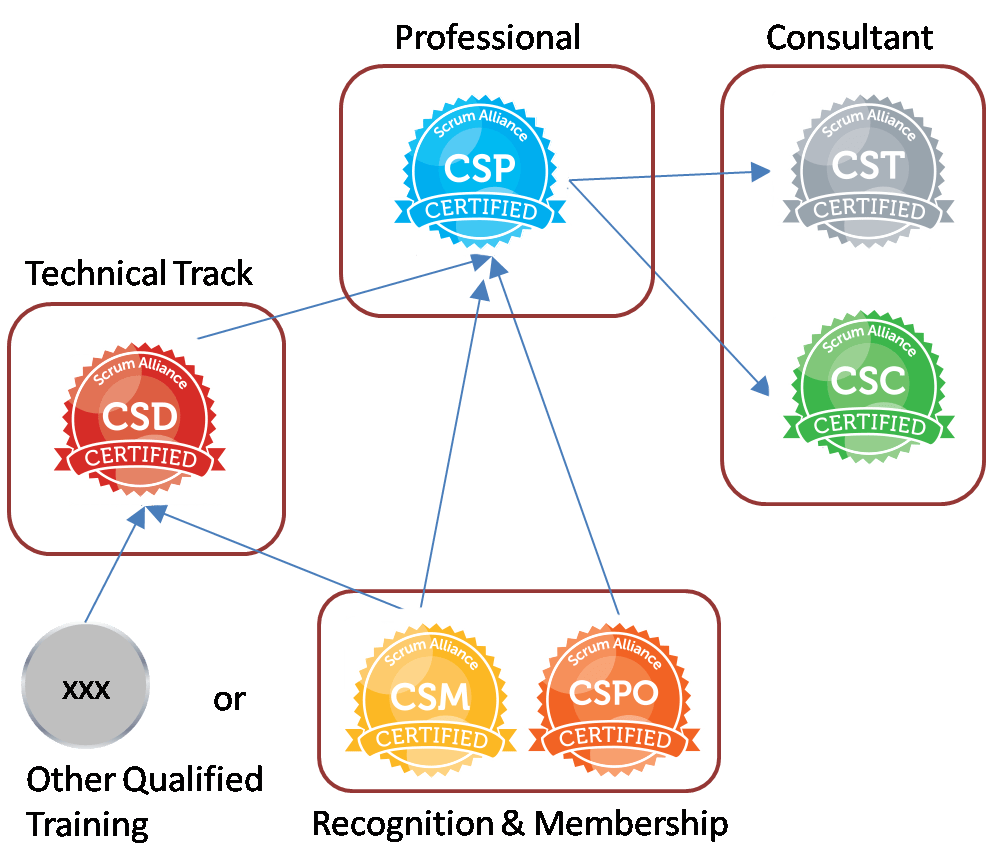
Recommended Certification Path with Scrum Alliance
When it comes to Scrum Alliance certifications, it is generally recommended to start with the Certified ScrumMaster® (CSM®) certification as the foundational course.
This certification provides a solid understanding of Scrum principles and equips individuals to serve as effective Scrum Masters. Once you have obtained the CSM certification, you can then consider pursuing the Certified Scrum Product Owner® (CSPO®) certification. This certification focuses on the product owner role and helps individuals gain a deeper understanding of how to maximize the value of products and effectively collaborate with development teams.
After completing the CSM and CSPO certifications, you can further enhance your Agile skill set by pursuing advanced certifications such as the Advanced Certified ScrumMaster® (A-CSM®) and Advanced Certified Scrum Product Owner® (A-CSPO®). These advanced certifications build upon the foundational knowledge gained in the CSM and CSPO courses and provide a more in-depth understanding of Agile practices and leadership.
Ultimately, the proper way of going through Scrum Alliance certifications may vary based on your specific goals and needs. It is recommended to assess your current role, experience level, and areas of interest to determine the most suitable certification path for your Agile journey.

The Role of Scrum Master
The Scrum Master role is crucial in Agile teams, ensuring effective collaboration, communication, and project delivery. Scrum Masters possess essential competencies, skills, and a servant-leader mindset. Scrum Alliance supports Scrum Masters’ professional development through certifications, resources, and community events, empowering them to excel in their roles. Whether you’re an elementary school student or a professional, understanding the significance of the Scrum Master role is key to embracing Agile practices and achieving project success.
What is a Scrum Master?
A Scrum Master is a facilitator and servant-leader who guides Agile teams in implementing Scrum practices and principles.
They act as a coach, ensuring that the team understands and adheres to Scrum values, rules, and processes.
Responsibilities of a Scrum Master
Facilitating Scrum Events: Scrum Masters organize and facilitate key events such as Sprint Planning, Daily Stand-ups, Sprint Reviews, and Retrospectives, promoting collaboration and keeping the team focused.
- Removing Obstacles: They identify and address obstacles that hinder the team’s progress, enabling a smooth workflow and helping the team achieve its goals.
- Guiding Self-Organization: Scrum Masters empower teams to self-organize and make decisions collectively, fostering a sense of ownership and accountability.
- Ensuring Agile Principles: They promote the adoption of Agile principles such as transparency, inspection, and adaptation, encouraging continuous improvement.
Competencies and Skills of a Scrum Master
- Effective Communication: Scrum Masters possess excellent communication skills to facilitate clear and open communication within the team and with stakeholders.
- Facilitation and Coaching: They have the ability to facilitate discussions, guide decision-making processes, and coach team members in Agile practices.
- Conflict Resolution: Scrum Masters are skilled at identifying and resolving conflicts, promoting a harmonious team environment.
- Servant Leadership: They embody servant leadership by putting the needs of the team first and supporting their growth and success.
The Scrum Alliance’s Support for Scrum Masters
Scrum Alliance provides valuable resources and support for Scrum Masters’ professional development, fostering their growth and mastery in the role.
Scrum Alliance offers certifications like the Certified ScrumMaster® (CSM®) and Advanced Certified ScrumMaster® (A-CSM®), which validate Scrum Masters’ knowledge and skills.
The Scrum Alliance website provides access to a vast collection of articles, webinars, and case studies that offer insights, best practices, and real-world experiences to help Scrum Masters excel in their roles.
Scrum Alliance also organizes events and conferences where Scrum Masters can connect with peers, share knowledge, and learn from industry experts.

Nurturing Agile Leadership
Agile leadership is instrumental in unlocking team performance and driving organizational success. Agile leaders possess essential qualities such as vision, adaptability, and effective communication. Scrum Alliance’s Agile Leadership offerings, including the CAL certification and valuable resources, enable leaders to acquire the knowledge and skills needed to guide Agile transformations effectively. Embracing Agile leadership principles not only benefits teams but also contributes to the long-term success of organizations.
Remember, even if you’re an elementary school student, understanding the importance of Agile leadership sets the foundation for a future where teams and organizations thrive in an ever-changing world.
Qualities of an Agile Leader
- Visionary and Empathetic: Agile leaders have a clear vision of where the team and organization are heading. They empathize with team members, understand their needs, and create an inclusive and collaborative work environment.
- Adaptive and Open-Minded: They embrace change, adapt to new circumstances, and encourage innovative thinking. Agile leaders foster a culture of learning and experimentation.
- Servant Leadership: Agile leaders prioritize the needs of their teams and remove obstacles that hinder progress. They empower team members, encourage autonomy, and enable self-organization.
- Effective Communicators: They excel in communication, both listening and articulating ideas. Agile leaders promote open and transparent communication to foster trust and collaboration.
Impact of Agile Leadership
Team Performance: Agile leaders inspire and motivate teams, fostering a high-performance culture. They provide guidance, enable continuous learning, and empower individuals to take ownership of their work.
- Adaptability: Agile leaders create an environment that embraces change and encourages agility. They help teams respond to evolving customer needs and market demands promptly.
- Organizational Success: Agile leadership drives organizational success by promoting a culture of innovation, enabling faster time-to-market, and enhancing customer satisfaction.
Scrum Alliance’s Agile Leadership Offerings
- Certified Agile Leadership® (CAL®): Scrum Alliance offers the CAL certification, designed for leaders seeking to guide Agile transformations effectively. CAL equips leaders with the mindset, tools, and techniques to lead in complex and uncertain environments.
- Resources and Community: Scrum Alliance provides a wealth of resources, including articles, webinars, and case studies, to support Agile leaders in their journey. Leaders can connect with a vibrant community of Agile professionals and learn from their experiences.

Agile Coaching
Agile coaching is a powerful catalyst for team success and continuous improvement. Agile coaches play a vital role in supporting teams through Agile adoption, facilitating collaboration, and unleashing team potential. Scrum Alliance’s Coaching certifications, including the CAC, CTC, and CEC, provide Agile coaches with the necessary skills and recognition to excel in their roles. Whether you’re an elementary school student or a professional, understanding the impact of Agile coaching sets the stage for building high-performing teams and achieving remarkable results.
The Role of Agile Coaches
- Support Agile Adoption: Agile coaches assist teams in understanding Agile principles and practices, guiding them in the adoption of Agile methodologies such as Scrum. They help teams embrace Agile values and transform their work processes.
- Continuous Improvement: Agile coaches foster a culture of continuous improvement by facilitating retrospectives, where teams reflect on their work and identify areas for growth. They help teams implement changes and experiment with new ideas.
- Collaboration Facilitation: Agile coaches promote effective collaboration within teams and across departments. They encourage open communication, facilitate meetings, and provide guidance on effective teamwork and conflict resolution.
Benefits of Agile Coaching
- Improved Team Performance: Agile coaches help teams unlock their potential and achieve high performance. They provide guidance, mentorship, and support, enabling teams to deliver value more effectively and efficiently.
- Enhanced Adaptability: Agile coaches help teams embrace change and adapt to evolving circumstances. They encourage a mindset of continuous learning, enabling teams to respond to customer needs and market demands.
- Empowered and Engaged Teams: Agile coaches empower team members, fostering autonomy, ownership, and engagement. They create an environment where individuals feel motivated to contribute their best and collaborate towards shared goals.
Scrum Alliance Coaching Certifications
- Certified Agile Coach (CAC): Scrum Alliance offers the CAC certification, designed for experienced Agile practitioners who aspire to become Agile coaches. CAC equips coaches with the knowledge, skills, and tools to effectively guide teams and organizations in Agile transformations.
- Team Coach (CTC) and Enterprise Coach (CEC): Scrum Alliance also offers CTC and CEC certifications, which recognize coaches’ expertise in working with teams or organizations at a larger scale. These certifications demonstrate advanced coaching skills and a deep understanding of Agile principles.

Scaling Agile with Scrum Alliance
Scaling Agile practices in large organizations can be a challenging endeavor. In this article, we will explore the challenges and strategies associated with scaling Agile and how Scrum Alliance supports this process. We will showcase Scrum Alliance’s guidance and resources for scaling frameworks such as Scrum@Scale and LeSS (Large-Scale Scrum). Get ready to unravel the world of scaling Agile in a way that even elementary school students can understand.
Challenges of Scaling Agile
Complexity: Scaling Agile in large organizations involves dealing with complexities arising from multiple teams, dependencies, and diverse stakeholders.
- Communication and Collaboration: Effective communication and collaboration across teams and departments become crucial as organizations scale Agile practices.
- Alignment and Synchronization: Ensuring alignment of goals, strategies, and priorities becomes more challenging as Agile initiatives spread across the organization.
Scaling Strategies
- Scaling Frameworks: Scrum Alliance supports scaling frameworks like Scrum@Scale and LeSS, which provide structures and practices for scaling Agile effectively. These frameworks offer guidance on team coordination, communication, and synchronization.
- Agile Coaches: Agile coaches play a vital role in scaling Agile practices. They provide guidance and support to teams and leaders, ensuring a smooth transition to scaled Agile initiatives.
- Cross-Team Collaboration: Encouraging collaboration and knowledge sharing among teams is crucial for successful scaling. Organizations can establish communities of practice, regular sync meetings, and shared resources to facilitate collaboration.
Scrum Alliance’s Support for Scaling Agile
- Scrum@Scale: Scrum Alliance provides resources, training, and certifications for Scrum@Scale, a framework designed by the creator of Scrum, Jeff Sutherland. Scrum@Scale enables organizations to scale Agile practices while maintaining flexibility and adaptability.
- Large-Scale Scrum (LeSS): Scrum Alliance also offers support for LeSS, another popular scaling framework. LeSS provides guidelines for applying Scrum principles in large-scale environments, fostering simplicity and transparency.

Scrum Alliance Community and Building Connections
Scrum Alliance’s community is a thriving global network that offers numerous benefits to Agile enthusiasts. By actively participating in local user groups, attending Scrum Alliance events, and engaging with the online community, you can enhance your learning, collaboration, and career opportunities.
Whether you’re an elementary school student or a professional, understanding the power of building connections in the Scrum Alliance community sets the stage for a fulfilling Agile journey and opens doors to new possibilities.
The Scrum Alliance Community
- Global Network: Scrum Alliance brings together Agile practitioners, professionals, and enthusiasts from around the world. It offers a platform to connect, collaborate, and share knowledge and experiences.
- Learning Opportunities: The community provides a wealth of learning opportunities through interactions with experienced Agile practitioners, industry experts, and thought leaders.
- Supportive Environment: Scrum Alliance’s community is known for its inclusive and supportive culture, where individuals can seek advice, share challenges, and celebrate successes.
Participating in Local User Groups
- Benefits of Local User Groups: Local user groups offer a chance to connect with like-minded individuals in your area, share experiences, and learn from one another. They often host meetups, workshops, and guest speakers to enrich your Agile journey.
- Learning and Networking: By participating in local user groups, you can expand your knowledge, gain insights from diverse perspectives, and build valuable professional networks.
Attending Scrum Alliance Events
- Global Gatherings: Scrum Alliance organizes global events that bring together Agile practitioners from all over the world. These events feature inspiring keynote speakers, interactive sessions, and networking opportunities.
- Learning from Experts: Attending Scrum Alliance events allows you to learn from industry experts, gain insights into the latest trends and practices, and hear success stories from Agile transformations.
- Career Advancement: Scrum Alliance events provide a platform to showcase your expertise, connect with potential employers, and explore career opportunities in the Agile community.
Engaging with the Online Community
- Agile Forums and Groups: Scrum Alliance offers online forums and groups where you can engage with the community virtually. These platforms provide spaces for discussions, asking questions, and seeking advice from experienced Agile practitioners.
- Webinars and Resources: Scrum Alliance hosts webinars and provides a wide range of resources, including articles, case studies, and videos, to support your continuous learning and professional development.

Agile Transformation Success Stories
Scrum Alliance has been instrumental in supporting organizations’ successful Agile transformations, leading to tangible benefits such as improved productivity, faster time-to-market, and enhanced customer satisfaction.
Through inspiring case studies and success stories, we can witness the transformative power of Agile practices. Whether you’re an elementary school student or a professional, these real-world examples highlight the positive impact of Agile transformations facilitated by Scrum Alliance.
Organization A: Boosting Productivity and Collaboration
- Background: Organization A, a software development company, struggled with inefficiencies and a lack of collaboration before its Agile transformation.
- Agile Implementation: With Scrum Alliance’s guidance, Organization A adopted Agile principles, Scrum practices, and cross-functional teams.
- Tangible Benefits: The organization experienced increased productivity, better alignment between teams, and improved collaboration. They delivered products faster, with higher quality and customer satisfaction.
Organization B: Accelerating Time-to-Market
- Background: Organization B, a manufacturing company, faced challenges in responding quickly to market demands and delivering products on time.
- Agile Implementation: With Scrum Alliance’s support, Organization B embraced Agile practices and implemented Scrum across its product development teams.
- Tangible Benefits: The company significantly reduced its time-to-market, enabling them to respond swiftly to customer needs and stay ahead of the competition. They experienced improved market share and increased customer loyalty.
Organization C: Enhancing Customer Satisfaction
- Background: Organization C, a service provider, struggled to meet customer expectations due to a lack of transparency and adaptability.
- Agile Implementation: With Scrum Alliance’s assistance, Organization C adopted Agile values and practices, focusing on customer collaboration and feedback.
- Tangible Benefits: The organization witnessed a remarkable improvement in customer satisfaction as it involved customers throughout the development process. They were able to respond quickly to changing requirements, resulting in better outcomes and higher customer loyalty.
Organization D: Nurturing Innovation and Agility
- Background: Organization D, a technology company, desired to foster a culture of innovation and adaptability within its teams.
- Agile Implementation: With Scrum Alliance’s support, Organization D implemented Agile practices, such as iterative development and continuous feedback loops.
- Tangible Benefits: The company experienced a surge in innovation and creativity, as Agile practices encouraged experimentation and learning. They became more adaptable to market changes and witnessed a significant increase in employee satisfaction and retention.

Scrum Alliance Resources as a Treasure Trove for Agile Practitioners
Scrum Alliance offers a treasure trove of resources to support Agile practitioners in their day-to-day work and professional growth.
From articles and case studies to whitepapers and templates, these resources empower Agile practitioners with valuable insights and guidance.
Articles: A Wealth of Agile Wisdom
Scrum Alliance’s collection of articles covers a wide range of Agile topics, from Agile principles and practices to leadership and team dynamics. These articles provide easy-to-understand explanations and practical tips for Agile practitioners at all levels.
Readers can gain insights into Scrum ceremonies, Agile frameworks, Agile mindset, and more. The articles are designed to simplify complex concepts and make them accessible to beginners and experienced practitioners alike.
Whitepapers: In-Depth Analysis and Research
Scrum Alliance’s whitepapers offer in-depth analysis and research on various Agile topics. These resources provide a deeper understanding of Agile principles, emerging trends, and industry best practices.
Readers can explore topics such as Agile adoption strategies, Agile project management, Agile metrics, and Agile leadership. The whitepapers serve as valuable references for Agile practitioners seeking to expand their knowledge and expertise.
Case Studies: Real-World Agile Success Stories
Scrum Alliance’s collection of case studies showcases real-world examples of successful Agile transformations and project implementations. These stories highlight the challenges faced, the strategies employed, and the tangible benefits achieved.
Readers can learn from the experiences of organizations that have embraced Agile, gaining insights into their Agile journey, lessons learned, and the impact on productivity, customer satisfaction, and business outcomes.
Templates and Tools: Practical Resources for Agile Practitioners
Scrum Alliance offers a range of templates and tools that Agile practitioners can use in their day-to-day work. These resources include user story templates, sprint planning tools, retrospective techniques, and more.
The templates and tools provide practical support for Agile ceremonies, project management, and collaboration. They enable practitioners to streamline their Agile processes and enhance team productivity.

Conclusion
In conclusion, the comprehensive blog posts about Scrum Alliance have provided valuable insights into the organization’s history, evolution, certifications, roles, and resources. Through its certifications, Scrum Alliance equips Agile practitioners with the necessary skills and knowledge to excel in their roles, while also providing a supportive community and extensive resources for continuous learning and professional development.
By participating in Scrum Alliance’s community, attending events, and engaging with the online network, individuals can build connections, share experiences, and enhance their Agile journey. The success stories of organizations that have undergone Agile transformations with Scrum Alliance’s support serve as inspiration, showcasing the tangible benefits achieved, such as improved productivity, faster time-to-market, and enhanced customer satisfaction.
Additionally, the wealth of resources offered by Scrum Alliance, including articles, whitepapers, case studies, and templates, serves as a treasure trove for Agile practitioners. These resources provide valuable insights, practical guidance, and in-depth analysis, empowering individuals to navigate the complexities of Agile practices and drive sustainable success.
It’s important to note that while Scrum certifications are valuable, to work confidently in a Scrum environment, a comprehensive understanding of Agile and Scrum product development is crucial. For those seeking a comprehensive source of truth, the Agile and Scrum Masterclass is highly recommended. This 29-hours comprehensive Masterclass provides a step-by-step guide from A to Z in Scrum, offering lifetime access to a rich source of knowledge that can be accessed whenever needed.
Embrace the world of Agile and Scrum with Scrum Alliance and embark on a journey of continuous learning, growth, and success.
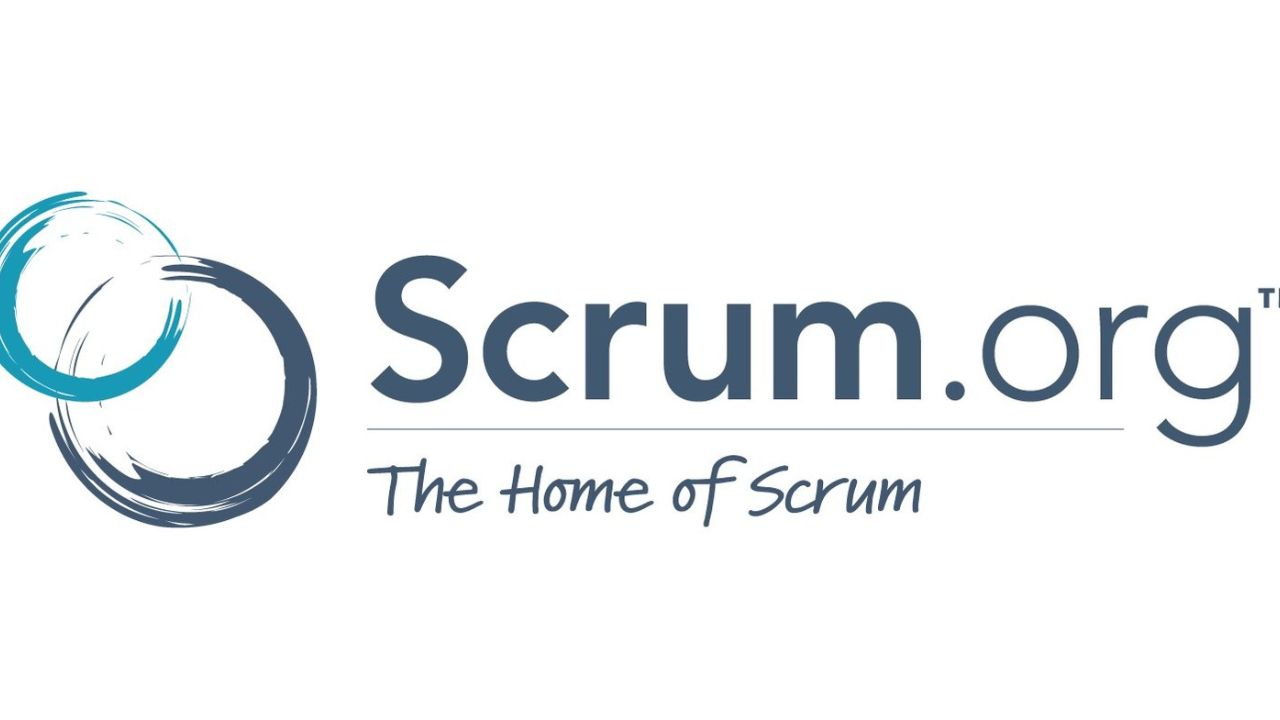
READ: Scrum.org Pros and Cons: Unveiling the Real Truth
In this blog post, we will take a deep dive into the world of Scrum.org, the Home of Scrum. Scrum.org. Click the image to read this analysis.
Scrum Alliance is a global nonprofit organization that provides Agile certifications, resources, and a supportive community for individuals and organizations practicing Agile methodologies.
Scrum Alliance offers a range of certifications, including Certified ScrumMaster® (CSM®), Certified Scrum Product Owner® (CSPO®), and Advanced Certified ScrumMaster® (A-CSM®), among others.
Scrum Alliance certifications validate an individual’s knowledge and skills in Agile practices, enhance career opportunities, and equip professionals with the tools to effectively lead Agile projects and teams.
To renew your Scrum Alliance certification, you can participate in continuing education activities, such as attending conferences, webinars, or training courses, and earn Scrum Education Units (SEUs) to meet the renewal requirements.
Scrum Alliance fosters a vibrant global community through local user groups, online forums, and events, providing opportunities for networking, knowledge sharing, and collaboration among Agile practitioners.
